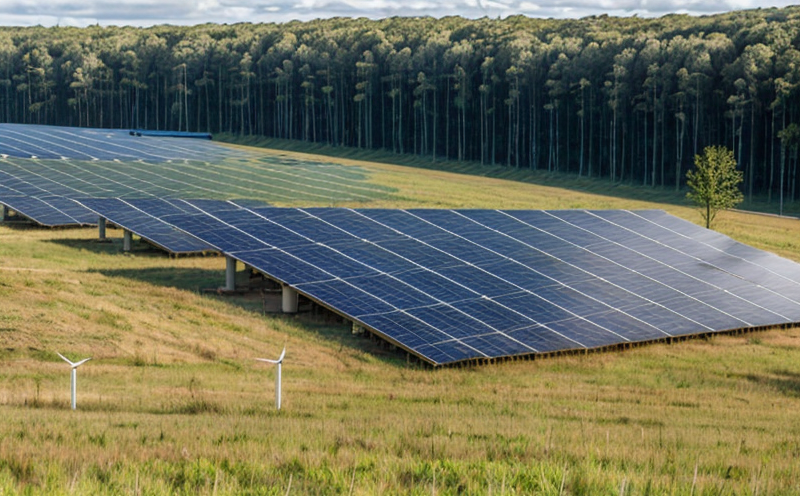EN 50583 Photovoltaic Panels Environmental Impact Test
The EN 50583 standard is a crucial guideline in assessing the environmental impact of photovoltaic (PV) panels. This test evaluates how PV panels perform under various environmental stressors, ensuring compliance with sustainability and safety regulations. Conducted by experienced professionals at Eurolab, this service guarantees accurate and reliable results that are essential for quality managers, R&D engineers, and compliance officers.
The testing process involves multiple phases designed to simulate real-world conditions that PV panels might encounter throughout their lifecycle. These include exposure to temperature changes, humidity levels, UV radiation, and mechanical stress. The aim is to ensure the durability, efficiency, and safety of solar panel products before they are deployed in actual installations.
At Eurolab, we employ state-of-the-art equipment to conduct these tests according to EN 50583 specifications. Our laboratories are equipped with climate chambers that can replicate a wide range of environmental conditions found globally. This allows us to accurately simulate the stresses PV panels may face over time.
The testing begins with careful preparation of the photovoltaic panels, ensuring they are representative of typical commercial products. Once prepared, the panels undergo several cycles of temperature and humidity variation, UV exposure, and mechanical stress. Throughout this process, detailed records are kept to monitor any changes in performance or structural integrity.
After completion, the results are thoroughly analyzed by our skilled technicians who compare them against the standards set forth in EN 50583. Compliance with these stringent criteria ensures that the tested PV panels meet all necessary requirements for environmental impact and safety. The final report provides comprehensive insights into the panel’s performance under various conditions, which is invaluable information for manufacturers looking to improve their products.
By adhering strictly to EN 50583 standards during testing, we ensure that our clients receive accurate data on how well their PV panels withstand environmental challenges. This not only helps in meeting regulatory requirements but also contributes significantly towards sustainable practices within the renewable energy sector.
Eurolab Advantages
At Eurolab, our commitment to excellence extends beyond just performing tests; it encompasses providing a full suite of services that support your organization's goals. Our team of experts ensures that each step of the EN 50583 Photovoltaic Panels Environmental Impact Test is carried out meticulously and efficiently.
We offer several advantages over other testing facilities:
- Comprehensive knowledge of international standards, including EN 50583
- State-of-the-art laboratory infrastructure for precise measurements
- Experienced personnel who understand the nuances of photovoltaic technology
- Prompt turnaround times without compromising on quality
- Confidentiality and security measures to protect sensitive data
- Collaborative approach with clients throughout every phase of testing
These factors combined make Eurolab your ideal partner for all aspects related to the EN 50583 Photovoltaic Panels Environmental Impact Test.
Quality and Reliability Assurance
EuroLab's rigorous quality control measures ensure that every test conducted meets international standards such as those specified in EN 50583. Our process begins with thorough preparation of the samples to be tested, ensuring they represent typical commercial products accurately.
The testing itself involves multiple stages designed to simulate real-world conditions encountered by PV panels during their operational life cycle. These include exposure to varying temperatures, humidity levels, ultraviolet radiation, and mechanical stressors. Each stage is meticulously documented so that any changes in performance or structural integrity can be traced back to specific environmental factors.
Upon completion of the tests, our skilled technicians analyze the data collected during each phase to determine compliance with EN 50583 requirements. Compliance indicates that the tested PV panels meet all necessary criteria for both environmental impact and safety standards.
The resulting report provides detailed insights into how well your PV panels performed under different conditions, which is crucial information for manufacturers seeking continuous improvement in product quality.
Our unwavering dedication to maintaining high standards guarantees accurate results that are essential for achieving regulatory compliance while promoting sustainable practices within the renewable energy industry.
Use Cases and Application Examples
| Scenario | Description |
|---|---|
| Initial Product Development | Testing new PV panel designs to ensure they meet environmental standards before mass production. |
| Compliance Verification | Verifying that existing PV panels comply with current regulations and guidelines. |
| New Market Introduction | Evaluating the performance of PV panels in different geographical locations to ensure they meet local environmental requirements. |
| R&D Innovation | Exploring innovative materials or manufacturing processes by subjecting prototypes to rigorous testing under EN 50583 conditions. |
| Supplier Evaluation | Evaluating the quality of PV panels supplied by various manufacturers through comparative testing against industry standards. |
| Performance Monitoring | Continuously monitoring the performance of deployed PV systems to identify potential issues early on and implement corrective actions promptly. |
| Regulatory Compliance | Ensuring ongoing compliance with evolving environmental regulations by regularly retesting existing products. |
This table illustrates various scenarios where EN 50583 Photovoltaic Panels Environmental Impact Testing can be applied. Each of these situations underscores the importance of conducting thorough testing to maintain product quality and ensure regulatory compliance across diverse markets and applications.





